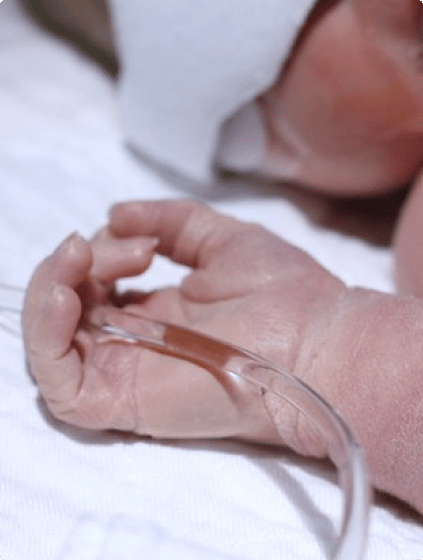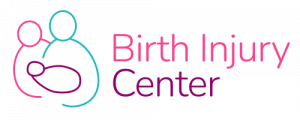Risk Factors for NEC
Necrotizing enterocolitis, or NEC, is a destructive disorder that causes the death of intestinal tissue in infants. NEC almost always occurs in preterm babies, particularly those of low birth weight. Symptoms are usually apparent soon after birth, typically before the infant leaves the children’s hospital. There are a number of significant risk factors for the development of NEC.
Home > Necrotizing Enterocolitis (NEC) > Risk Factors for NEC
- Last Updated Date: September 22, 2023
What is necrotizing enterocolitis?
Necrotizing enterocolitis, or NEC, is a condition in which parts of the baby’s intestinal tissue start to die off. Although the exact causes of NEC are still being researched, this is believed to be related to the growth of dangerous bacteria in the intestine. These cause severe damage to the tissue, which causes it to die off. When this happens, severe complications can develop. For example, if the baby’s intestinal wall develops a hole, then material from inside the digestive tract can spill out into the abdomen, leading to a severe and even life-threatening infection.
Although it’s not always possible to predict exactly which babies will develop NEC, there are certain factors that put a baby at an increased risk.
What are the risk factors for necrotizing enterocolitis?
Research has uncovered a number of factors that increase the risk for the development of NEC in babies. Although some of these are well established as being major independent risk factors, researchers are still debating whether some of them are truly important in determining an individual baby’s likelihood of developing NEC.

Prematurity
Being born early (before 37 weeks of gestation) is one of the strongest risk factors for the development of NEC. Although it’s certainly not impossible for a full-term infant to develop NEC, the majority of cases occur in premature babies. The earlier the baby is born, the greater the likelihood that he or she will develop NEC.
There are a number of reasons why preemies are at a higher risk for NEC. Their immune systems are not well developed yet, and so they’re much more vulnerable to infections. Their digestive systems are also not fully developed, and are unable to provide a barrier against the entry of bacteria into the tissue. Additionally, the blood flow to the tissues of the digestive tract is not fully established. Before full-term, a baby is adapted to be protected in the womb and fed through the umbilical cord; this is why their immune and digestive systems aren’t fully developed yet.
Low birth weight
Similarly, a baby who is born with a low birth weight is at a higher risk for developing NEC. Although premature babies are always small compared to babies born at full term, some babies are even smaller than would be predicted by their gestational age. The lower the baby’s birth weight, the greater the risk that he or she will develop NEC. Very small babies are more vulnerable, and their bodies are less able to defend against infection by dangerous bacteria.
Formula feeding
Another very clearly established risk factor for NEC is receiving formula rather than breast milk. Babies who are fed formula are significantly more likely to develop NEC, compared with babies who are fed human breast milk. The human breast milk may be the mother’s own milk, or it may be pasteurized breast milk from a donor.
Scientists are still not sure exactly why formula feeding increases the risk of NEC. It’s believed that certain factors present in human breast milk inhibit the growth of potentially damaging bacteria in the intestines. Babies who are fed formula don’t get the benefit of these factors, and are more likely to develop NEC than are babies who get human milk.
Difficult birth
During a challenging birth, the baby may be deprived of oxygen. Although the brain is the most sensitive organ when it comes to oxygen deprivation, the digestive system can also be affected by a lack of oxygen. The lack of oxygen can damage intestinal tissue and lead to NEC. This may be the reason why some studies have found that birth by cesarean section decreases the risk of NEC. When providers recognize that a difficult birth is likely and intervene by performing a C-section, they may prevent the infant from developing conditions like NEC that are associated with oxygen deprivation.

Blood transfusions
Babies who receive a blood transfusion are at a higher risk for NEC. Scientists are still debating why this association exists. Babies generally receive blood transfusions because they have anemia, or a low number of red blood cells. Because these are the cells that carry oxygen, babies with anemia may not be able to deliver enough oxygen to their intestinal cells, which can create a higher risk of NEC. It may actually be the anemia that causes the increased risk for NEC.
The blood transfusion itself may also change how the intestine responds to feeding in ways that lead to a higher risk of NEC. However, many researchers believe that the blood transfusion itself doesn’t directly cause an increased risk, but is simply an indicator that the baby is sick. In this view, it’s the illness that leads to the NEC, rather than the transfusion itself.

Major medical problems
When babies who are born at full term develop NEC, it’s usually associated with other major medical issues in the baby. Conditions that are associated with NEC include congenital heart disease, sepsis (an infection in the bloodstream), or hypotension (low blood pressure). Significant medical issues like these weaken the infant’s body and leave them more vulnerable to the growth of dangerous bacteria in the intestines.
Race
A number of studies have found that black babies are at an increased risk for developing NEC. It’s still not clear exactly why this racial disparity exists, although it’s believed to represent a combination of social and biological factors. More research is needed to clarify the reasons for the disparity, so that it can be addressed.
Being around other babies with NEC
Although it’s not common, NEC outbreaks do occasionally occur within a NICU. Particularly damaging bacteria can colonize the digestive system of one baby, and then may spread to other babies, causing them to develop NEC as well. Taking precautions to keep babies as isolated as possible may help to decrease the risk of an NEC outbreak.
What if your baby has NEC?
Some babies with NEC can be treated with nonsurgical methods, such as IV antibiotics. However, in many cases, the treatment for NEC involves one or more surgical procedures. The surgery is intended to remove the damaged parts of the intestine and then reconnect the remaining tissue. Although it can be lifesaving, this type of surgery can also leave a baby with lifelong medical problems related to having a short intestine.
NEC is a very dangerous conditions. Around 40% of babies who have NEC die from it.
Many parents of babies affected by NEC are devastated to learn that the formula that was fed to their babies may have caused them to suffer from a lifelong illness or even die. If they were aware of the risks, these parents would have chosen a different feeding method for their babies, which could have saved their lives. The manufacturers of these formulas have been held liable in courts for the harm that they caused in failing to warn parents of the risks of feeding the product to babies.

If your baby suffered serious harm or died from NEC, and you believe that it may have been connected to formula feeding, you may want to consider contacting a lawyer with experience in this field of law. Your family may be able to receive compensation. Although it won’t undo the harm that was caused to your family, this can help to offset the significant financial burden that NEC and its treatment can create.
Due to the statute of limitations, you have a limited amount of time in which you can file a suit, so it’s important not to delay. Have your case reviewed by a birth injury attorney to find out whether you may be eligible to file.
Written by:
Birth Injury Center Team
The Birth Injury Center aims to create informational web content and guides to help women and their families seeking support and guidance for birth injuries caused by medical negligence. All of the content published across The Birth Injury Center website has been thoroughly investigated and approved by medical expert Natalie Speer, RNC-OB.

